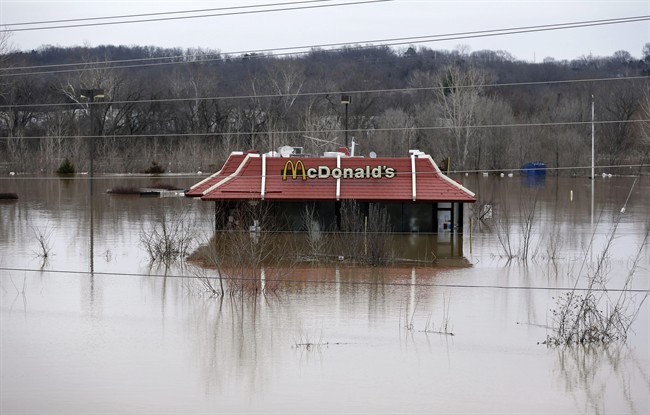ST. LOUIS – Federal officials were monitoring 19 vulnerable levees on the rising Mississippi River and its tributaries, warning that hundreds of homes in Illinois and Missouri could be threatened by a rare winter flood that already forced the partial closure of interstate highways and widespread evacuations.

As the swollen rivers and streams pushed to virtually unheard-of heights Tuesday, an unknown number of inmates were transferred out of an Illinois state prison threatened by flooding and Missouri’s governor activated the National Guard to help divert traffic from submerged roads.
Record flooding was projected in some Mississippi River towns after several days of torrential rain that also caused sewage to flow unfiltered into waterways.
The Meramec River near St. Louis was expected to get to more than 3 feet above the previous record by late this week.
At least 18 deaths over several days in Missouri and Illinois were blamed on flooding, mostly involving vehicles that drove onto swamped roadways.
The river on Tuesday spilled over the top of the levee at West Alton, Missouri, about 20 miles north of St. Louis. Mayor William Richter ordered any of the town’s approximate 520 residents who had not already evacuated to get out of harm’s way.
Across the river, in Alton, Illinois, dozens of volunteers helped place sandbags ahead of where water is expected to rise.
Mayor Brant Walker said in a statement that “even with our best efforts of sandbagging and pumping,” flooding was expected at least in the basements of the downtown business district.
- Can you tell fake alcohol from real? Why methanol is so hard to detect
- Halifax Walmart death: Store will not reopen for ‘weeks’ as remodelling continues
- Will Canada’s tax ‘holiday’ create a ‘mess’ for businesses? Some say yes
- Alberta seeks to ‘de-risk’ oil, gas pipeline investments in wake of Trump victory
In another eastern Missouri town, Union, water from the normally docile Bourbeuse River reached the roofs of a McDonald’s, QuikTrip and several other businesses. The river reached an all-time high Tuesday, nearly 20 feet above flood stage.

Get daily National news
Interstate 44 was closed near the central Missouri town of Rolla, and a 10-mile section of Interstate 70 was shut down in southern Illinois before it was reopened late Tuesday afternoon. Hundreds of smaller roads and highways were also closed across the two states, and flood warnings were in effect.
Missouri Gov. Jay Nixon activated the National Guard to assist with security in evacuated areas and to help keep road closure sites clear.
In southern Illinois, the Department of Corrections transferred an unspecified number of inmates from a state prison to other locations because of flooding risks. The facility houses nearly 3,700 inmates.
In St. Louis, more than 500 volunteers turned out in blustery, cold conditions to fill sandbags where a flooded waterway threatened hundreds of homes.
The city later trucked 1,500 of the sandbags south to a nearby county to fortify a wastewater treatment plant threatened by the swollen Big River.
The Mississippi River is expected to reach nearly 15 feet above flood stage on Thursday at St. Louis, which would be the second-worst flood on record, behind only the devastating 1993 flood.
Alderman Larry Arnowitz said up to 500 homes could be threatened if the River Des Peres – a man-made storm sewer channel that flows through south St. Louis into the Mississippi River – rises much more than projected. But he was confident that with no rain in the forecast for the next several days, and with the help of the thousands of sandbags, everything would be OK.
Lisa Muxo, 45, said her basement was already taking on water.
“These are our neighbours, our friends,” said Muxo, who brought her teenage son and three of his friends to help sandbag. “We need to help each other.”
The high water was blamed on the shutdown of a wastewater treatment plant on Monday just south of St. Louis, causing sewage to go directly into nearby rivers and streams. The Metropolitan Sewer District of St. Louis said the Fenton wastewater treatment plant, which is designed for 6.75 million gallons per day of flow, was treating nearly 24 million gallons per day at the time of the malfunction.
One of the two wastewater plants in Springfield, Missouri, also failed, allowing partially treated sewage to flow into a river.
The U.S. Coast Guard closed a 5-mile portion of the Mississippi River near St. Louis due to flooding. Capt. Martin Malloy cited high water levels and fast currents in the river, which is a vital transportation hub for barges that carry agricultural products and other goods.
In central and southern Illinois, flood warnings were in effect two days after a winter storm brought sleet and icy rain. Major flooding was occurring along the Kankakee, Illinois, Sangamon and Vermilion rivers.
In Granite City, Illinois, about 30 residents of a flooded trailer park idled in a Red Cross emergency shelter in a church basement. The park’s property manager told Shirley Clark, 56, and other displaced residents that it could be another 10 to 12 days before they’re able to return to their homes.
“We need help over here,” said Clark, a diabetic who said she left behind her insulin supply. “We’re just holding on.”
The Midwest wasn’t alone. Heavy rain continued in parts of the South, such as Georgia and eastern Alabama, which has in parts seen more than 14 inches of rain since Dec. 21.
—
Scher Zagier reported from Granite City, Illinois.







Comments